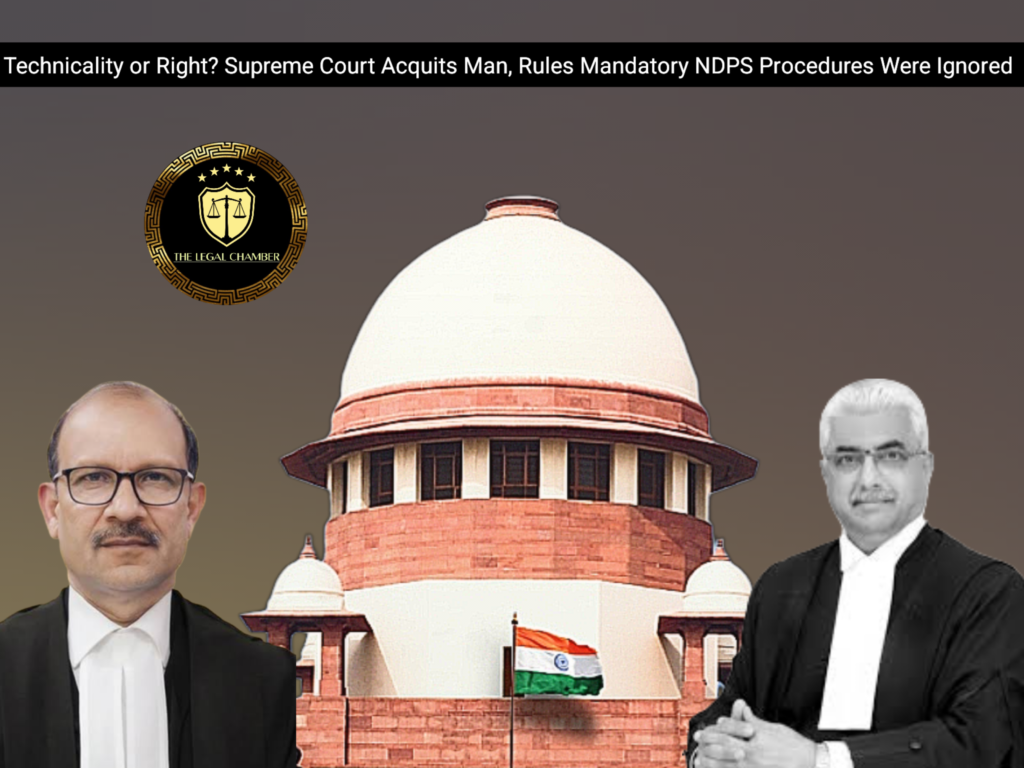
The Supreme Court held that the High Court erred in dismissing the appeal solely on the ground of delay, particularly when the appellant was incarcerated. On merits, the Court acquitted the accused due to fatal procedural lapses: non-compliance with mandatory sampling guidelines under Standing Order No. 1 of 1989 and Section 52A of the NDPS Act, which rendered the seizure and FSL report unreliable. The trial court also erred in clubbing separate recoveries to constitute commercial quantity without evidence of conspiracy under Section 29.
Facts Of The Case:
On July 16, 2018, based on source information, police apprehended the appellant, Nadeem Ahamed, and a co-accused, Amit Dutta, near Laxmi Store in Kolkata. A search, conducted in the presence of a Gazetted Officer, led to the recovery of 125 grams of a substance suspected to be heroin from the appellant and 130 grams from the co-accused. The substances tested positive for heroin at the spot. The seized contraband was treated as a single commercial quantity (255g). The samples were sent to the Forensic Science Laboratory (FSL), which confirmed the presence of heroin. The trial court convicted the appellant under Sections 21(c) and 29 of the NDPS Act and sentenced him to 10 years of rigorous imprisonment. His appeal to the Calcutta High Court was dismissed as time-barred due to a delay of 1183 days, citing financial crisis as the reason for the delay. The appellant then appealed to the Supreme Court.
Procedural History:
The procedural history began with the trial court convicting the appellant and sentencing him to 10 years imprisonment on August 26, 2021. His regular appeal under Section 374(2) of the CrPC to the Calcutta High Court was filed with a significant delay of 1183 days. The High Court dismissed the appeal, refusing to condone the delay and noting that the co-accused’s appeal had already been rejected. The appellant then approached the Supreme Court via Special Leave Petitions (SLPs), which were granted. The Supreme Court condoned the delay in filing the appeal, heard the matter on merits, and ultimately acquitted the appellant, setting aside the judgements of the courts below.
READ ALSO :Supreme Court Ruling: Courts Must Appoint Arbitrator Even If Serious Fraud is Alleged
Court Observation:
The Supreme Court made several critical observations leading to the acquittal. It first held the High Court’s dismissal of the appeal solely on the ground of delay was unjustified, given the appellant’s incarceration and financial hardship. On merits, the Court found the trial court committed a grave error by clubbing the separate recoveries from two individuals to constitute a commercial quantity without any evidence of a prior conspiracy under Section 29 of the NDPS Act. Furthermore, the Court identified fatal procedural lapses, including non-compliance with mandatory sampling guidelines under Standing Order No. 1 of 1989 and a complete failure to follow the inventory and certification procedure mandated under Section 52A of the NDPS Act. These lapses rendered the integrity of the seizure and sampling process doubtful and the FSL report inadmissible, creating reasonable doubt about the prosecution’s case.
Final Decision & Judgement:
Case Details:
Case Title: Nadeem Ahamed vs. The State of West Bengal Citation: 2025 INSC 993 Criminal Appeal No.: (Arising out of SLP (Cri.) No(s). 9446-9447 of 2025) Date of Judgement: August 05, 2025 Judges/Justice Name: Justice Aravind Kumar and Justice Sandeep Mehta
Download The Judgement Here